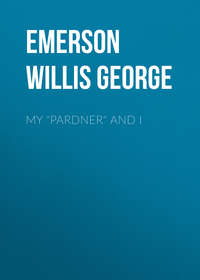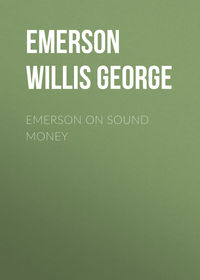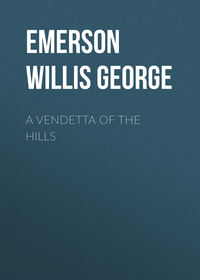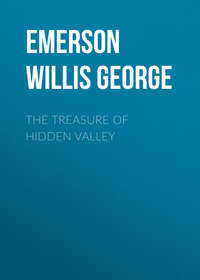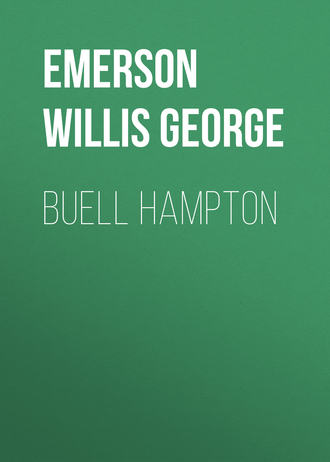 полная версия
полная версияBuell Hampton

Willis George Emerson
Buell Hampton
THEME
Once an American mother, with the wealth of a Croesus and a lovely daughter, longed for titled distinction.
In her net she caught an adventurer, clothed in a frayed-out remnant of a former nobility – and an eyeglass.
They bartered and came to terms, – dollars, title, – while an innocent girl was thrown in as an incident.
“And what is writ is writ, —Would it were worthier.”Childe Harold’s Pilgrimage.Every author who, early or late, finds it his delightful, yet dangerous, privilege to “get under cover” owes something to Pliny the Younger for recording the fact that Pliny the Elder used to say that “no book was so bad but that some good might be got out of it.”
With this delightful assurance as an incentive, the author of “Buell Hampton” began, some twelve years ago, to construct the story herewith presented.
There is so much in the following tale of the great Southwest that is based upon facts and actual happenings that I hardly know where history ceases and fiction begins.
I know the grain-bags of promise were torn open and found to be filled with the tare seeds of disappointment, which were blown carelessly about by the wind-puffs of adversity.
The Osborns, the Hortons, queenly Ethel, and Marie, – the singing girl, – Lord Avondale, Jack Redfield, and Hugh Stanton are still in the land of the living, and will doubtless peruse these pages with varying degrees of approval. Judge Lynn died about one year ago, but will long be remembered in the Southwest for his oddities and grotesque sayings. I was present when a shadow fell between the old banker and his beautiful young wife, and, with the days, it deepened, until it was obliterated by the clods of Graceland Cemetery.
The prairie-fire, the foot-race, and the pitiless hot winds were actual occurrences, while the fields of sunflowers are, in season, still to be seen in all their gorgeous splendor.
Major Buell Hampton is a flesh and blood personality, with whom I spent many an enjoyable evening, and whom I learned to love for his wealth of wisdom and kindness of heart. His rise and fall, the tragedy on the red banks of the Cimarron River, and his strange disappearance, are a part of the tragic history of the cattle-range of the Great Southwest. The music of the old violin still lingers with me, and is inseparable from the strange character and complex destiny of this wonderful man.
W. G. ECHAPTER I. – AT LAKE GENEVA
IT was only a game of tennis that brought on this affair of love’s entanglement.
Ethel Horton, with rich, maidenly flushes on her soft cheeks, played as she had never played before – played and won.
Athletic suppleness and vivacious buoyancy were emphasized in every movement of this intense American girl.
With heightened color, she contested the game, point by point.
It was thrilling sport, and her clever opponent was Lenox Avondale, an Englishman.
And while this exciting neck and neck game was in progress, her mother, Mrs. J. Bruce-Horton, was idly conversing with Mrs. Lyman Osborn on a wide veranda of the hotel that overlooked the blue waters of the lake.
“Really,” she observed, leaning back in her easy chair, “Lake Geneva is not such a bad place, after all. One can get on here very well for a few days.”
“Oh, yes,” said Mrs. Lyman Osborn, as she seated herself languidly, and gazed across the blue waters, “yet I fancy that in time it would become quite dull for us, it is so thoroughly American. Let me push the cushions under your shoulder a little farther, dear.”
“Thank you,” replied Mrs. Horton, “that is more comfortable. What does Doctor Redfield say of my illness?”
“That in a week’s time we can continue our journey to the Southwest.”
“My dear husband,” murmured Mrs. Horton, reflectively, “how glad he will be to see Ethel! It has been four years since the child was placed in that fashionable London school; she was then only fifteen. Her dear father will hardly know her.”
“The thanks of all are due to you, my dear Mrs. Horton, for the educational advantages that Ethel has enjoyed.”
“Yes, my husband is so determined in his ideas; but I manage to spend as little of my time on the frontier, you know, as possible, and I certainly shall see to it that Ethel does not deteriorate under the influence of our stupid American ways. She is certainly a girl of rare gifts, and I could never have forgiven myself had she been educated in the States.”
“Quite right,” assented Mrs. Osborn, “your husband may stay with his herds of cattle, and my husband may stand at his bank counter, year in and year out, if it pleases them to do so, but you and I will take our annual trip to merry England,” and Mrs. Osborn laughed a ripple of indifference at the crude taste of their respective husbands.
Mrs. J. Bruce-Horton was a woman in her early forties. Her features were regular, and her complexion had a youthfulness not in keeping with her age. Her heavy brown hair was most becomingly arranged. Her neatly fitting suit of tweed, – a production of Redfern, – in keeping with the latest London style, admirably set off her rather stately figure. Her companion, Mrs. Lyman Osborn, was probably thirty-five, although in appearance she seemed much younger. A pink and white skin, fair hair, and blue eyes combined in giving her a bewitching appearance.
They were returning from a trip to England, whither they had gone to bring home with them Ethel Horton, who had recently finished her education in a London school. At Chicago Mrs. J. Bruce-Horton had been taken suddenly ill; and Doctor Redfield had been recommended and summoned. On his advice they had come to Lake Geneva until Mrs. Horton sufficiently recovered to continue their journey to southwestern Kansas.
Mr. John B. Horton was known in the West as a great cattle baron. Soon after the war he married in Baltimore, and moved West to engage in the cattle business. His lonely dugout of frontier days had given way to one of the most palatial residences in the West. This beautiful home had been erected on the site of the dugout, near the line between Kansas and No-Man’s-Land, and not far from the Cimarron River. Horton’s Grove was known far and wide. Indeed, it was practically the only timber in that section of the country. In this grove two mammoth springs burst forth from the hillside, and formed a beautiful stream named Manaroya. Here, near the edge of the grove, and on the banks of the gurgling brook, less than three miles from Meade, Kansas, John Horton had erected his home.
With their accumulation of wealth had come an ambition on the part of Mrs. J. Bruce-Horton – as she inscribed her cards – to give her daughter Ethel all the advantages of a thorough education. Vassar had been thought of; but the banker’s wife, Mrs. Lyman Osborn, had suggested that foreign travel was indispensable in reaching a correct decision.
Captain Lyman Osborn was a veteran of the Union army, and was many years his wife’s senior. He was engaged in the banking business at Meade, and divided his time between his duties at the bank, and his son, Harry, who was not more than five years of age. The father fairly idolized the boy, and, while he was with him, was quite content that his young wife should travel abroad – if that were her pleasure.
Against her husband’s wishes and advice, Mrs. J. Bruce-Horton had selected a London school for their daughter, and since Ethel had been placed therein, she had spent a portion of each year in England, accompanied by her bosom friend, Mrs. Lyman Osborn. In many ways these two women were dissimilar, but their very dissimilarity seemed to bind them more closely together. They had both become tinctured with the weakness of title-worship, and perhaps the most cherished wish of Mrs. J. Bruce-Horton was that Ethel should marry into some titled English family.
“I do wonder,” she sighed, “if there are any people desirable for one to know stopping at the hotel.”
“Very doubtful,” lamented Mrs. Osborn. “The fewer Americans we know the better for us when among our friends on the other side.”
“Quite true,” assented the other, devoutly.
“It is so embarrassing, when one is among one’s English friends, to have American acquaintances intruding themselves. Oh, here comes Ethel!” observed Mrs. Horton.
“Oh, mamma!” cried Ethel, as she came running toward them, all out of breath, “our side won.”
“Why, Ethel, what have you been doing?” exclaimed her mother, as she held up her hands in amazement.
“I have just finished the jolliest game of tennis I ever played in my life; and my! did n’t we do them up!”
“Such language, Ethel; do you know – ”
“Why, mamma, if you could have seen how we Americans vanquished two rum Englishmen you would have shouted ‘Hail Columbia’ and ‘The Star Spangled Banner’ forever!”
“Ethel, Ethel, such language is so unbecoming!”
“I know, mamma, but I am in America once more, and I feel in a ‘Hail Columbia’ sort of mood. There,” said she, “and there,” as she stooped and kissed her mother affectionately. “Now don’t scold me any more. My, but I am having lots of fun.”
Mrs. J. Bruce-Horton adjusted her glasses, which had been displaced by Ethel’s impetuous embrace, and inquired, “Did you say that there were some English families stopping at the hotel, Ethel?”
“Yes, mamma, the Countess Berwyn and Lady Somebody – I don’t remember her name – and her son and an English friend of his.”
“Not such an undesirable place to stop, after all,” remarked Mrs. Lyman Osborn.
“No, indeed!” exclaimed Mrs. J. Bruce-Horton. “But really, Ethel, you must be more particular. You must not speak so disrespectfully of our English friends. You know we have so many across the water.”
“Why, mamma, I am not disrespectful; I am only happy, and so glad that I am home again in my own country. Well, bye-bye, I must go and dress for dinner – Oh, yes, will Doctor Redfield be here this evening?”
“I presume so,” answered her mother, inquiringly, “but why do you ask?”
“Oh, nothing,” replied Ethel, and she hurried away – with her young face all aglow with happiness.
“Brimming over with animation!” said Mrs. Osborn, as she looked at the retreating form of the girl. “Together we must control spirited Ethel until she is safely anchored in the harbor of English nobility.”
“Yes, indeed, we must,” acquiesced Mrs. Horton; “and it is very kind of you to take so much interest in helping me.”
Ethel Horton was a tall and stately girl. She had laughing eyes, pouting red lips, and teeth that resembled the delicate tints of the conch-shell. Her intellectual forehead, slightly aquiline nose, radiantly youthful complexion, and wealth of dark brown hair, made her a creature beautiful to look upon.
“I wonder why Ethel inquired about Doctor Redfield,” mused Mrs. Horton, thoughtfully.
“Oh, it was nothing,” rejoined Mrs. Osborn, “still we must beware of these broad-shouldered men with blond mustaches. He really is quite attractive; however, Ethel is not sentimental, is she?”
“Good gracious, no!” responded Mrs. Horton, emphatically, “not in the least.”
“So much the better, then,” affirmed her companion; “it will be a great deal easier to work out a destiny that will be for her own good. We should be able to make a great match for her, my dear. I will help you, and we shall not fail. Now we must find out about these English people.”
CHAPTER II. – A CHANCE MEETING
WHEN Ethel returned to her mother after dressing for dinner, her tennis suit had been exchanged for an airy lace dress of soft material and such complete simplicity that it set off her youthful form to the very best advantage.
“By the way, mamma, Lady Avondale is the other Englishwoman stopping at the hotel. She and the Countess Berwyn are traveling together.”
“Lady Avondale!” exclaimed the mother, “did you say Lady Avondale? My dear friend, Lady Avondale!”
“How charmingly fortunate,” lisped Mrs. Lyman Osborn.
“Yes, indeed,” agreed Mrs. Horton, with unmistakable complacency, “how kind they were to us a year ago! You know, Ethel, we were entertained at Lady Avondale’s country-house a year ago, and oh, what a lovely estate they have, and how delightfully kind they were to us. We must send our cards at once.”
“Oh, here comes Doctor Redfield!” exclaimed Mrs. Osborn; and the three ladies turned toward a tall, broad-shouldered man of about thirty, who bowed politely as he approached them.
Dr. Jack Redfield, as he was familiarly called by his friends, although young in years, had nevertheless “won his spurs” in the medical profession. He had a lucrative practice in Chicago, and occupied a chair in one of the leading medical colleges. His head was of a Napoleonic cast. He had deep-set, expressive blue eyes, short brown hair, a rather heavy blond mustache, and a square chin indicative of great strength of character. In physical proportions he seemed an athlete. His neatly fitting attire proved that he kept abreast with the conventionalities.
“How are you feeling this evening?” he asked, addressing Mrs. J. Bruce-Horton.
“Oh, much better, thank you.”
“I fear it is almost too cool for you here on the veranda, and I suggest the wisdom of your retiring to the parlors.”
“Oh, do you really think so, doctor? It is so very pleasant here, and yet it is very thoughtful of you to mention it. Perhaps,” continued Mrs. Horton, turning to Mrs. Osborn, “we had better go in.”
“I will accompany you,” said Doctor Redfield. “I think it best to change the medicine.”
“Will you come, Ethel?” asked Mrs. Horton, as they arose.
“No, mamma, it is so very pleasant out here, and you know that I am not ill.”
As the invalid and her companion moved away, Doctor Redfield turned to Ethel and said, “I trust you are enjoying your temporary sojourn at Lake Geneva.”
“Oh, very much, indeed,” replied Ethel, with a smile, “I think the rowing is simply grand, and the shady walks and drives are superb.”
“Of course as a summer resort,” said Doctor Redfield, “it may not compare with Bath or Brighton, but I doubt if the Lakes of Killarney or the scenery surrounding them surpass, in point of beauty, Lake Geneva.”
“You are quite an American, are n’t you?” said Ethel, laughingly.
“Intensely so,” replied Doctor Redfield.
“Well, we can’t quarrel on that point, for I am more in love with my own country than before I went abroad.”
“I beg pardon,” interrupted Mrs. Osborn, who had returned from escorting her companion to the parlors, “but Mrs. Horton is waiting for you, doctor.”
“Very well, I shall come at once,” he answered, while a flush of embarrassment overspread his face; then, turning to Ethel, he said, “I trust that Lake Geneva may continue to be as interesting during the next few days as it has thus far proved.”
“Thank you,” replied Ethel, and the doctor was led away by Mrs. Osborn.
In the meantime, Mrs. J. Bruce-Horton had sent her own and Mrs. Osborn’s card to Lady Avondale. Soon after Doctor Redfield concluded his professional call, Lady Avondale presented herself, and the titled Englishwoman and her American friends were profuse in their protestations of pleasure at the meeting.
After the dinner-hour, when Dr. Jack Redfield was leaving the hotel, he looked wistfully along the veranda in the hope of again seeing Ethel, but she had disappeared.
He was not only a skilful practitioner, but he knew the value of a patient like Mrs. J. Bruce-Horton, and when he had such an one on the road to recovery he was willing to humor her whims as much as the occasion permitted. As he walked toward the lake, down the graveled path so exquisitely bordered on either side with fragrant flowers, which were watered by frequent whirlabout fountains, each throwing its refreshing spray far over the lawn, a feeling of satisfaction at his professional success, and of complete contentment with the whole world, elated him. This feeling might have been continued indefinitely but for a single incident – a fate-like incident – that changed the story of his life.
As he came to a turn in the path he found Ethel reclining on a rustic seat and looking out over the blue waters of the lake.
“I am not a highwayman,” said Ethel, jestingly, “but nevertheless I mean to waylay you.”
“Indeed!” said Jack, inquiringly.
“Yes, I wanted to ask you about dear mamma. You do not think she is dangerously ill, do you?”
“By no means,” replied Doctor Redfield, reassuringly, “her indisposition is rapidly giving way to my treatment, and I think that within a week she will have quite recovered.”
“Oh, thank you, doctor, I have been so worried about her.”
“With the assurance that I have given, you may cease worrying entirely,” said Jack as he turned to leave her.
“Why are you in such haste to go?” asked Ethel, coquettishly.
“I am not particularly in haste,” replied Jack, “but perhaps I interrupt your reverie.”
“Yes, but I want to be interrupted,” returned Ethel, laughingly.
“Very well,” said Jack, seating himself near her.
Jack Redfield was anything but a Beau Brummel. The idea of yielding himself to maiden sovereignty had never occurred to him. Indeed, his lack of homage to woman might almost have been interpreted as a poverty of gallantry. Nevertheless, in the few days that he had been making professional calls on her mother, he had awakened to a knowledge of the feet that Miss Ethel interested him, to say the least. There was a wild dash of independence and of frankness about her that possessed a charm for him which he was unable to analyze.
As Jack looked out over the lake he was conscious that Ethel was studying him closely. Presently she said, “I cannot make myself believe that you are a physician.”
“Indeed, why not?” interrogated Jack, much amused by her frankness. “You evidently expected me to perform a miracle in your mother’s case, and, as I have failed to do so, you judge me harshly.”
“Oh, no! not that,” protested Ethel, “but then, I always fancied that doctors, who give bitter medicine, cut up people and saw bones, should be old and grim. Now, you don’t look like a doctor at all to me.”
“Well, as I have to make my living in the uncanny way that you have described, I must say that I am glad every one does not share your hasty judgment of me.”
“Oh, thank you,” said Ethel, “that’s very well put. I know you think I am not very kind.”
“No, I would hardly go as far as that,” said Jack, “but I doubt my ability to hold my own in a conversation with you, much more than I would my skill in a surgical operation or a bad case of measles. I have faith that my treatment would be successful, but I have no faith that you would not vanquish me very quickly with your repartee and your direct way of putting things.”
“Oh, what a refreshing compliment,” laughed Ethel. “I thought because you were a doctor that you were stoical and grim, but you really seem quite the reverse.”
“I am indeed surprised,” said Jack, “not at you, but rather at your impression of me. I did n’t know that I possessed the gift of being complimentary to ladies; in fact, the social side of my life has been very much neglected. My time has been so taken up with my studies and profession, that I have cultivated but little the ways and customs of the social world.”
“Well, you are different from some people I know – Dr. Lenox Avondale for instance – but then he is English and you are an American.”
“I am quite content to be an American, with all my stupidity in regard to social matters. He doubtless was reared among a titled aristocracy, and society is a second nature to him. I believe – pardon my frankness – that your life has been much the same, and that you will continue to dwell in a social atmosphere. From remarks made by your mother and her friend I doubt not that they have mapped out a great career for you.”
“I trust I am too loyal an American,” returned Ethel, proudly, “to take part in any career that is not entirely congenial to my own tastes, and your deductions as to yourself are quite incorrect. For my part, I think more of one who is noble and manly than I do of those English or American idlers, who think only of the latest fashions and who change their attire half a dozen times a day and are, even then, at a loss to know just what to do to kill time.”
Jack looked at Ethel as she was speaking, and he was conscious of a budding admiration for her that was quite a new feeling to him.
“Bravo,” said he, applaudingly, “those are grand sentiments. No one can say that they are un-American; but I fear that you are surrounded by conditions that may force you to change your views.”
“Oh, I assure you,” said Ethel, very earnestly, “I have the greatest admiration for workers, whether with the brain or with the hand. It is hardly fashionable, I suppose, to admit such views, but I can’t help my convictions.”
“I hope,” said Jack, “that you may have the courage of your convictions, but I am not blind. I have already discovered that which is marked out for you. If your mother and Mrs. Osborn were not occupied with Lady Avondale, this accidental meeting of ours would not have taken place.”
“A destiny marked out for me?” inquired Ethel, in surprise.
“Yes,” said Jack, and his voice shook a little as he spoke, “a destiny that does not lie along the line of brain-workers. It is along a highway burnished with titles, on the one side, and with wrecked hopes, broken hearts, and much unhappiness on the other.”
A silence followed. Presently he arose and quietly clasped her proffered hand. Over it he bowed in deepest respect. She was conscious that a strange, intense earnestness was moving this strong man. His every emotion said goodbye, but his lips spoke no word. He turned quickly from her and disappeared in the gathering twilight, and still, without knowing why, she remained where he had left her – watching, wondering, waiting.
CHAPTER III. – A DECLARATION
LADY AVONDALE was very gracious to the Americans, flattering their vanity by presenting them to the Countess of Berwyn. On the Following day, much to their gratification, she introduced them to her son, Dr. Lenox Avondale.
Doctor Avondale was, in fact, a rather distinguished personage. He was perhaps forty years of age, and while not an especially brilliant conversationalist, he talked quite fluently of the race-track, the chase, and kindred topics. Of the English army he knew much, having been appointed surgeon therein by Her Majesty. There he gained a wide reputation for skill in his profession. He was, however, decidedly blasi, and not even the usually alluring subject of out-door sports was sufficient to arouse in him more than a passing interest. He had a tendency to yawn at the dinner-table, and exhibited but little consideration for those occupying less exalted positions than himself. He cultivated a bored expression and complained a great deal about the “beastly American customs.” He had obtained an indefinite leave of absence from the Army and was thoroughly “doing the States.” His elder brother, Lord Avondale, had contracted an intermittent fever the year before, while in Australia. This fever had developed into serious complications, and his death was considered to be a question of only a short time, whereupon Dr. Lenox Avondale would succeed to the titles and estates, which are among the oldest in England. The estates, however, were so heavily encumbered with debts that it had been considered necessary to cast about for some American heiress, who, in consideration of sharing the titles, would bring with her enough American dollars to relieve the property of its indebtedness; indeed, Lady Avondale’s mission to America was to assist her son in this undertaking.
Mrs. J. Bruce-Horton, in conversation with Lady Avondale, had assured her that if Ethel married a suitable person she should receive three million dollars on her wedding-day, and perhaps twice that much at the death of her parents.


